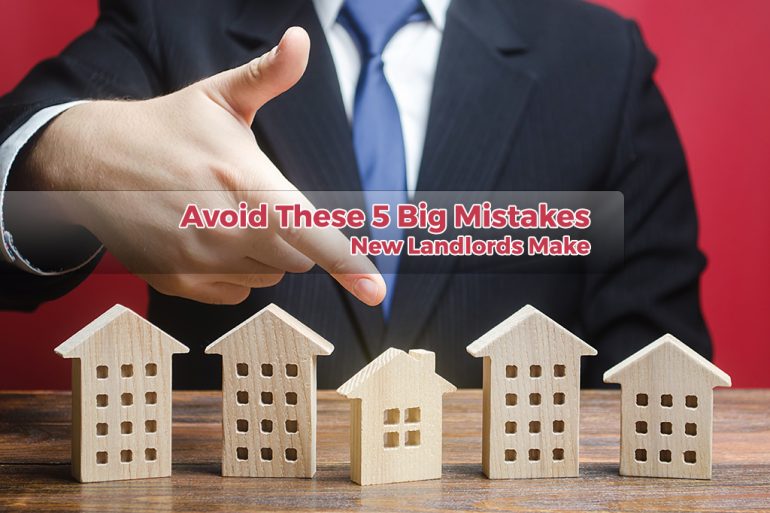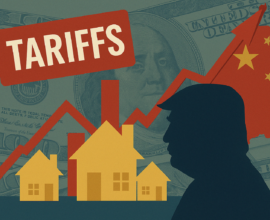Avoid These 5 Big Mistakes New Landlords Make
Have you just purchased your first investment property and found some renters? You’re probably excited to dive into your new journey as a landlord feet first, so we’re here to make sure you don’t slip and fall on the way in. Let’s talk about five big mistakes that new landlords make.
Avoiding these five big mistakes will make managing your investment properties and adding properties to your portfolio a much smoother experience. By implementing the recommended strategies early on, you will drastically shorten your learning curve on the way to becoming an expert landlord.
Mistake #1: Renting for Too High or Too Low
One of the first mistakes made by new landlords is acquiring a new investment property and immediately listing it for rent at a rate higher than every other comparable property in the neighborhood. While this can play out favorably if the property condition reflects the higher price, this is rarely the case.
Do your due diligence prior to acquiring the property and run rental comparisons to currently rented properties in the immediate area. This will prevent your hopes from being built up and your bubble from being popped. Find what the typical rental rate is in the area for a property of similar size, layout, and quality of interior finishes.
By choosing a rental price that is right on target for what the market is demanding, you will attract a significant number of eyes and scheduled tours from potential renters.
By listing too far above what it will likely rent for, you will get eyes on the property but no scheduled tours. The property will sit on the market for months, adding to your holding costs with no money going in your pocket. Once the property has sat for months, it begins developing what is known as market weariness.
Market weariness is when a property is on the market for an extended period of time without being rented or purchased. Other buyers and renters see that it has been sitting without activity and determine that there is something wrong with it for this reason.
On the flip side, be careful not to list your property for too little. Many new landlords are worried that they will not be able to rent their property out quickly enough and end up listing it below market value. Although it rents up quickly, they are then stuck with a property that doesn’t cash flow and a tenant who is unlikely to agree to rent increases.
Another common scenario for new landlords is purchasing an existing investment property that is already rented out with the intent to eventually increase the rent when the lease comes to term. Many new landlords feel bad about asking long-term tenants to pay higher rents (especially if they are great tenants historically) and end up owning a losing investment that does not meet their initial investment analysis.
This has the potential to be financially devastating and incredibly discouraging for new landlords. Avoid this altogether by pricing your property appropriately from the outset.
Mistake #2: Forcing Your Best Tenants Out
Another common mistake made by new landlords is approaching stable and reliable tenants and demanding rent increases without considering the potential repercussions.
Rent increases are necessary every now and then in order to maintain profitability, adjust for inflation, and account for increased annual tax assessments. However, when done without regard to the cost of vacancy and losing tenants, it can be disastrous to your bottom line (not to mention reputation in the market).
Having a conversation with your tenants upfront about future rent increases is the best way to navigate this uncomfortable situation and prevent any awkwardness. The mistake that many (maybe even most) new landlords make is going to all tenants every year and demanding $50, $100, or even higher rent increases.
This can come across terribly to your best tenants, especially if they concede and agree to pay the increase one or two years in a row.
If you can accrue tenants who consistently and reliably pay their rent on time and renew their leases each year, it is better in the long run to allow them to renew at their same lease rate or a previously agreed-upon escalation (e.g., every three years it increases by $100) rather than forcing them out when they cannot agree to an increase in rent every year. The cost of holding a vacant unit is much higher than having an occupied unit that may be $50 below its market rent.
Here’s an example. If the market rent for your property is $1,200 per month but you have a rockstar tenant who pays $1,100 per month, it makes sense to renew their lease for the same rate or only slightly higher if they agree to stay. If you decide not to renew if they do not agree to $1,200 per month, you will not only incur the cost of preparing the unit for the next tenants (usually more than the net gain from rent increase) but also have added vacancy costs.
If your unit is vacant for 30 days (which is accounting for makeready, marketing, leasing, and negotiations), you will lose out on $1,200 worth of rent. This negates the entire year of gain you would receive from renting it for $100 more per month.
Mistake #3: Forgetting Repairs and Maintenance
Even though you are not the one living in the unit, it is ultimately your property and responsibility at the end of the day! Be sure to keep track of all preventative maintenance and repairs that need to be made throughout the period of your ownership.
It is quite easy to get carried away fixing things as they pop up or reinvesting cash flow with no concern for large upcoming expenses. When those inevitably roll around, you are at a loss and must dip into your personal funds.
A great way to navigate this is by putting together a spreadsheet with all of your properties, as well as the age and expected life of the major systems and appliances at the property. This is also a great way to keep track of when repairs are made and include invoice information for future reference.
By breaking down the age and expected useful life of major systems such as the HVAC, roof, certain plumbing fixtures and appliances, etc., you can prepare for the repairs that need to be made and budget for what is called your replacement reserve. Your replacement reserve is an amount set aside specifically for these capital improvements.
Having this spreadsheet will also aid you in knowing when you should plan to have these funds saved up and ready to deploy.
Mistake #4: Not Enough Communication
When it comes to new landlords, one of the most common mistakes made is not communicating enough with tenants. Although it may seem overwhelming, daunting, or unnecessary, it is preferable to overcommunicate with your tenants rather than undercommunicate and leave them in the dark.
This is one of the quickest and easiest ways to lose tenants when it is time to sign lease renewals. Tenants who feel they cannot get in touch with you or that they are a burden on you are less likely to want to continue paying to stay at your property or pay rent increases if they are to occur.
Establishing clear and consistent lines of communication with your tenants, checking in on them when you know they have fallen on hard times, and making sure that they are enjoying their stay at your property all play into building healthy communication that establishes rapport and trust.
Mistake #5: Unequal Enforcement of Leases
This is an often-overlooked mistake made by new landlords, but it leads down a dangerous and slippery slope. The mistake is not enforcing lease terms and conditions equally and fairly across all tenants regardless of any situation, friendship, or relationship that may be present.
When you get to know your tenants, it is sometimes hard to enforce late penalties on rent or to evict them should they violate the lease agreement altogether. It’s even more difficult when they specifically ask for leniency or for you to bend the rules for them.
Although it is an uncomfortable situation, it is crucial that you view the scenario through the lens of a business owner rather than a friend. Would you ask them to sacrifice their livelihood if you made a mistake that was detrimental to their wellbeing? If they are willing to put you in a position of legal liability for violating Fair Housing laws because of their mistake, that is not friendly or professional.
This is one of the main reasons that many full-time investors and real estate professionals do not mix business with family or friends. Giving special treatment to friends or family complicates matters for them and potentially puts them in a position of liability.
Once you concede to one tenant’s demands to be forgiven for not paying rent on time, then you are inherently treating the rest of your tenants unfairly by charging late fees or going through with evictions. Do not let yourself get sucked into this wormhole — it is a difficult one to get out of.
By making a clear distinction between business matters and friendship with any of your tenants, you can avoid this situation altogether. Compartmentalize your life by keeping your real estate business and your personal life and relationships separate.
Start Your Landlord Career Off on the Right Foot
There are many mistakes that new landlords make. Some are part of the learning process, but others are mistakes that everyone should avoid.
Use the tips provided to navigate through your first several years as a landlord and avoid these mistakes, making your investment journey a much more profitable and enjoyable one.
Matt Moreland is a licensed Realtor in the state of Texas, using his background in finance on a daily basis as he serves his investment sales clients across the country. Specializing in multifamily acquisitions, his passion is sharing knowledge about real estate investing with others and helping his clients learn more about growing their wealth through real estate investing. When he is not working he loves spending time with his wonderful wife and daughter, as well as learning new languages and skills such as woodworking.








